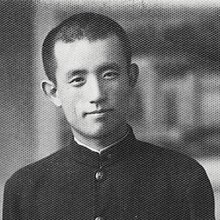
Back Yun Don-cu Azerbaijani Yun Dong-ju Spanish Yun Dong-ju French Jun Dongdzsu Hungarian Յուն Դոնգ-Ջու Armenian Yun Dong-ju Italian 尹東柱 Japanese 윤동주 Korean Юн Дончжу Russian Yun Dong-ju Vietnamese
This article has multiple issues. Please help improve it or discuss these issues on the talk page. (Learn how and when to remove these messages)
|
Yun Dong-ju | |
|---|---|
 Yun in 1942 | |
| Born | 30 December 1917 Lung-ching, Chi-lin, Republic of China |
| Died | 16 February 1945 (aged 27) Fukuoka Prison, Fukuoka, Empire of Japan |
| Resting place | Longjing, Jilin, China |
| Occupation | Poet |
| Language | Korean |
| Nationality | Korean Domicile |
| Education | Yonhi College |
| Alma mater | Rikkyo University (dropped out) Doshisha University (expelled) |
| Genre | Poem |
| Notable works | 《하늘과 바람과 별과 詩》(Sky, Wind, Star and Poem) |
| Korean name | |
| Hangul | 윤동주 |
| Hanja | |
| Revised Romanization | Yun Dongju |
| McCune–Reischauer | Yun Tongju |
| Art name | |
| Hangul | 해환 |
| Hanja | |
| Revised Romanization | Haehwan |
| McCune–Reischauer | Haehwan |
| Website | |
| yoondongju | |
Yun Dong-ju or Yoon Dong-ju (Korean: 윤동주, Korean pronunciation: [jundoŋdʑu]; 30 December 1917 – 16 February 1945) was a Korean poet. He is known for his lyric poetries and for his poems dedicated to the Korean independence movement against the Empire of Japan.
Yun was born in Longing, Jilin, China.[1] After studying at the Myeongdong School, he moved to Pyongyang and graduated from Soongsil Middle School (now Soongsil High School in Seoul[clarification needed]). He later moved to Seoul and attended Yonhi College. During his second year at Yonhi College, he published a poem in the boy magazine, and officially appeared in the paragraph. In 1942, he went to Japan and entered the English Literature Department at Rikkyo University, but later that year, he transferred to the English Literature Department at Doshisha University. But was arrested by the Japanese police for alleged anti-Japanese movements in 1943. While imprisoned in a Fukuoka, he died at the age of 28, leaving over 100 poems. His cause of death in Fukuoka prison is uncertain, but theories have been raised based on accounts of saltwater injections and medical experiments performed at that prison. His book, The Sky, the Wind, the Stars, and the Poem (하늘과 바람과 별과 詩), was published posthumously.
He was recognized as one of the conscientious intellectuals in the latter half of the Japanese colonial period, and his poems were based on criticism and self-reflection of the Japanese colonial government and the Joseon Governor-General. His cousin and close friend, Song Mong-gyu, was arrested while attempting to join the independence movement and was subjected to Japanese experimentation in Japan. While in Japan, he adopted the Japanese name, Hiranuma (平沼). In addition to his Korean name, the nicknames Dongju and Yunju were also used.
- ^ ""Yoon Dongju" LTI Korea Datasheet available at LTI Korea Library or online at: "Author Database : Yoon Dongju - Korea Literature Translation Institute". Archived from the original on 14 December 2013. Retrieved 14 December 2013.